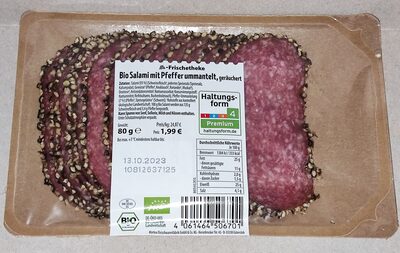
Barcode: 4061464506701
Bio-Salami mit Pfeffer ummantelt
HARAM
📝 Reason: The product contains Schweinefleisch (pork meat) and Speisegelatine (gelatin from pork), both of which are explicitly Haram in Islam as per Quran 5:3. The presence of these ingredients makes the entire product Haram. Other ingredients like Natriumnitrit and Natriumascorbat are generally considered Halal unless derived from Haram sources.
📄 Certificates: None
Ingredients:
Details
Understanding the Halal Status of Bio-Salami mit Pfeffer ummantelt
When it comes to dietary choices, understanding the Halal status of products is essential for many consumers. In this post, we will explore the ingredients of Bio-Salami mit Pfeffer ummantelt and determine why it is labeled as Haram. With rising awareness of nutritional choices, clarity about what’s in your food can help align eating habits with personal beliefs.
What Makes Bio-Salami mit Pfeffer ummantelt Haram?
The primary reason for the Haram designation of Bio-Salami mit Pfeffer ummantelt is the presence of certain ingredients that go against Islamic dietary laws. The two crucial ingredients contributing directly to its Haram status are:
- Schweinefleisch (Pork Meat): Pork is explicitly forbidden in Islam as per the Quran (5:3). Thus, any product containing pork is unequivocally Haram.
- Speisegelatine (Gelatin from Pork): This gelatin is derived from pork and poses the same issues, making it equally Haram.
Due to these two ingredients, the entire product is considered Haram. Consumers looking for Halal options should avoid this product and seek alternatives that meet Halal standards.
Other Ingredients in Bio-Salami mit Pfeffer ummantelt
In addition to the two key Haram ingredients, Bio-Salami mit Pfeffer ummantelt contains:
- Natriumnitrit (E250): Generally considered Halal unless derived from Haram sources. Natriumnitrit is typically used as a preservative in many processed meats but does not inherently contribute to the Haram status of the product.
- Natriumascorbat (E301): This ingredient is commonly used as an antioxidant and is generally recognized as Halal. It is derived from Vitamin C and is safe for consumption under Islamic dietary laws.
While Natriumnitrit and Natriumascorbat have less concern regarding Halal compliance, the presence of Schweinefleisch and Speisegelatine overshadows their acceptance.
Understanding E-Numbers and Their Halal Status
E-numbers are codes assigned to food additives, and they help consumers identify ingredients more easily. Here’s a breakdown of the relevant E-number ingredients in Bio-Salami mit Pfeffer ummantelt:
- E250 – Natriumnitrit: Usually serves as a curing agent in processed meats. It is often scrutinized for its origins, and consumers should ensure its derivation is Halal.
- E301 – Natriumascorbat: An antioxidant commonly sourced from plants, making it generally acceptable in Halal diets.
In summary, while some components may be Halal-friendly, it is the inclusion of pork that outright prohibits the product from being Halal. This highlights the importance of checking ingredient lists thoroughly.
Conclusion
For those seeking Halal dietary options, Bio-Salami mit Pfeffer ummantelt is not a suitable choice. Understanding the ingredients and their religious implications is essential for making informed decisions. Always look for reliable Halal certifications and labels when shopping for meat products, especially processed ones. By staying informed, you can make choices aligned with your dietary values and theological beliefs.

